This post contains affiliate links (I get a commission at no extra cost to you for purchases made through links in this post).
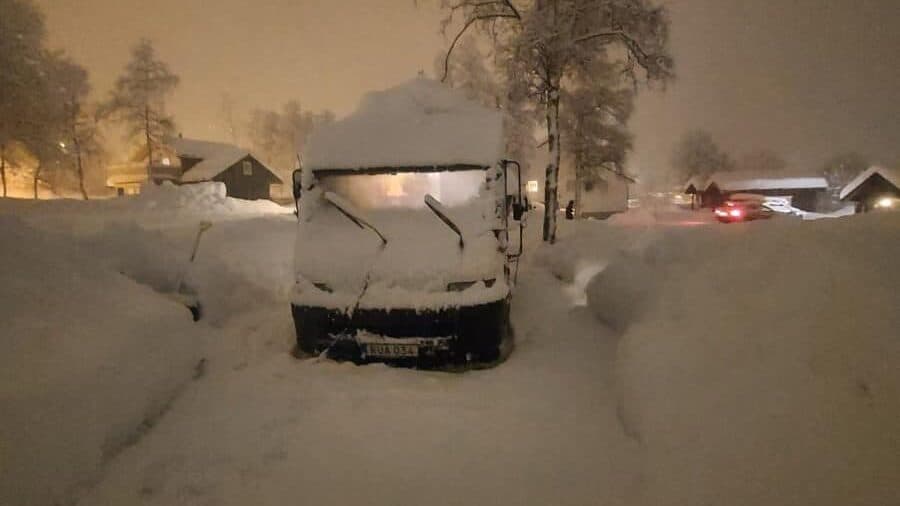
Are you wondering if living in your motorhome, RV, or caravan during the winter is possible or if it is a good idea? I Will share my experience and knowledge about this after an entire winter in Norway.
Living in a motorhome, RV, or caravan during the winter is possible, and it is something I recommend if you enjoy winter and winter sports. You can stay warm in almost any RV, even during freezing winters, and use all the functions you would in the summer, like the water system, bathroom, and shower.
Most people are worried that they can’t stay warm or not be able to use the functions in their vehicle. But, still, you can, for us with older motorhomes, RVs, or caravans that are not made for winter or even for those with newer vehicles that are only “made” for summer use or not winterproofed or winterized, we sometimes will have to make some adjustments beforehand. But, still, it is possible.
YES, YES, YES, it is possible to live in your motorhome, RV, or caravan, even during cold winters!
Would You Recommend RV Full-Time Living During Snowy Winter?
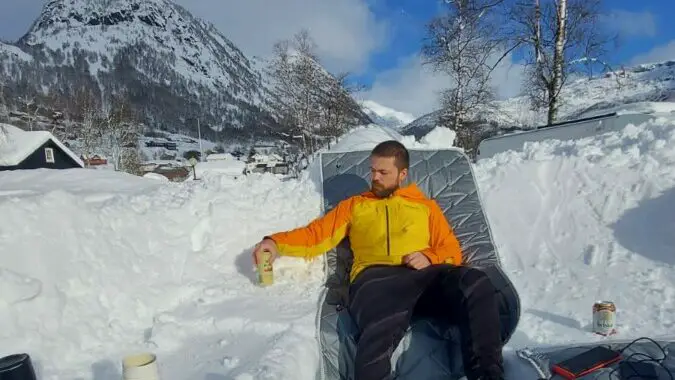
If you enjoy winter, I recommend living full-time or short-term in a motorhome, RV, or caravan during a snowy winter. During winter camping, you can enjoy an entire season of skiing or other winter activities that you wouldn’t be able to do otherwise. However, I would not recommend it if you don’t enjoy winter.
Chances are, if you usually are not a big fan of winter, you would hate living in a motorhome or RV during winter since you would still be forced out during the cold to shovel snow, refill water, empty the grey and black water tanks, things are probably going to freeze at some point that you need to fix.
If you, during those moments, already hate winter and on top of that, you are “stuck” inside your RV since you don’t enjoy spending time outside during winter, it’s not going to be for you, and in that case, I would not recommend it at all.
Although, on the other hand, if you, like many others, enjoy winter and like winter sports, getting used to winter camping could be one of the best things in your life since it opens up so many opportunities! We all know that the famous winter locations and ski resorts can be costly when it comes to accommodations, but a season spot at a campsite could be super cheap!
Alright, so we have talked about some general/trivial things if winter camping even could be something for you, so now let’s cover some of the questions most people have when it comes to the questions surrounding if it is possible to live in a motorhome, RV, or caravan during the winter before we go into the pros and cons about it.
let’s cover some of the questions most people have around winter camping.
How To Keep a Motorhome or RV Warm In The Winter?
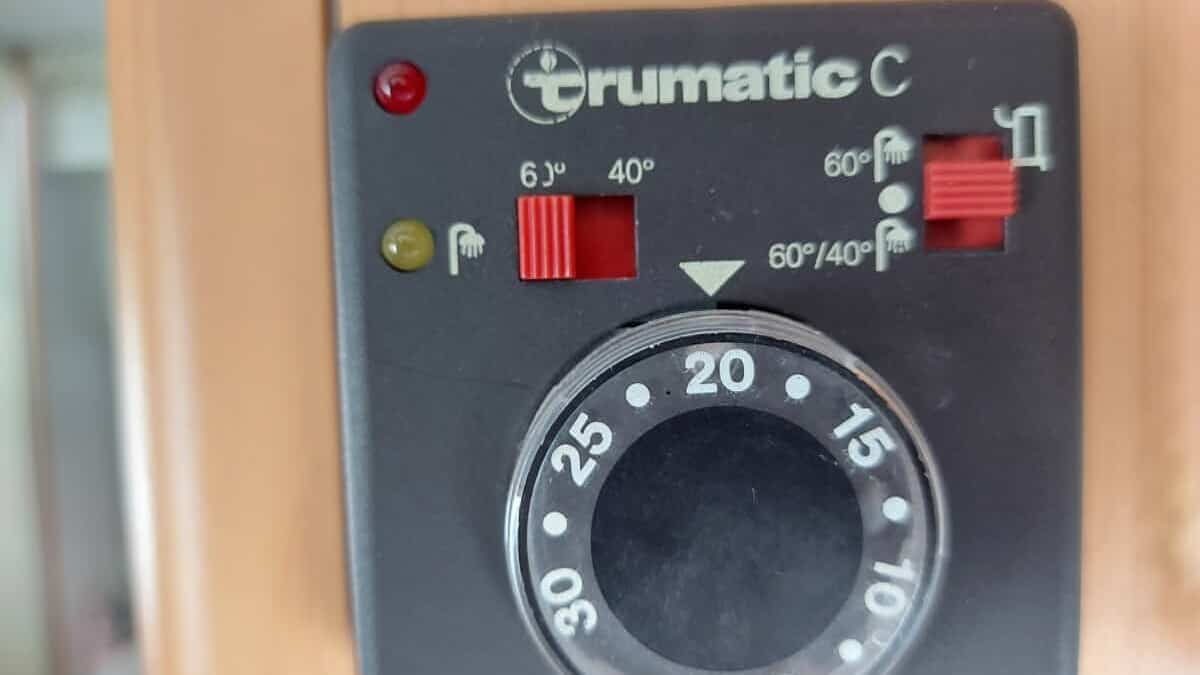
Motorhomes, RVs, and caravans have a heating system that is usually powered with propane, sometimes with diesel, and occasionally with electricity. This furnace is, in most cases, more than sufficient for keeping an RV warm, even during frigid winters with temperatures far below freezing.
My original motorhome heater in my poorly insulated motorhome built in 1996 was sufficient for heating my motorhome during an entire Norwegian winter with occasional temperatures around -20 Celcius or -4 Fahrenheit, and it wasn’t even running on max power so it could have handled colder temperatures as well.
During that winter, the average temperature was probably around -10 Celcius or 14 Fahrenheit. So it costs me about 300 USD each month in propane costs to heat my motorhome and run the other appliances like the stove. Still, most of the propane consumption in winter comes from the furnace.
To learn how much it will cost for you at various outside temperatures, I have shared that with you in a previous article that I would recommend so you are not surprised when you start winter camping, then depending on what temperatures you will be in, maybe you want to invest in a bigger propane tank or a device that automatically shifts to the second bottle when the first one is empty.
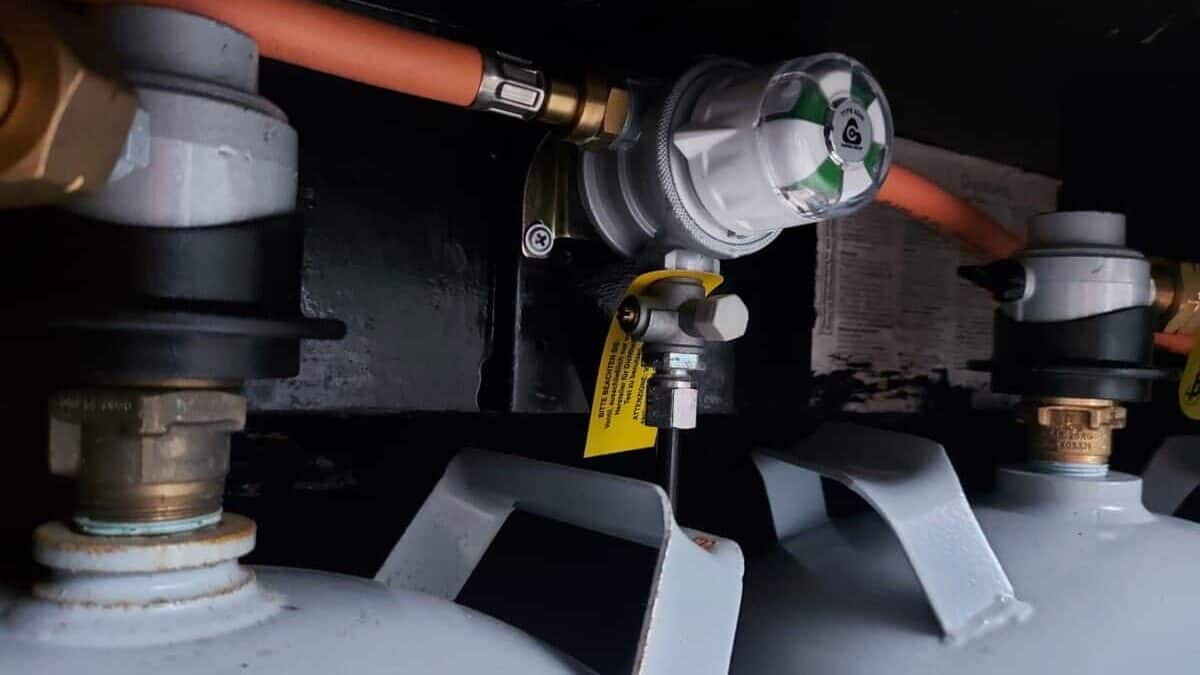
A general rule is that a propane bottle ALWAYS gets empty in the middle of the night!
So as you understand, there is a heating system that can be powered even without electricity in almost all motorhomes, RVs, caravans, or vans. However, if you buy a camper van that someone has built themselves, you better ensure that it has a heater installed and decent insulation.
Running an original heater/furnace is going to keep your RV warm. Still, to stay comfortable and to keep an even temperature in your motorhome and increase your chances of maintaining the water system from freezing, there are some more things to consider, and to learn this, I recommend reading my other article where I go through how I keep my motorhome warm in winter with 9-tips.
While we are talking about how to keep an RV warm during the winter, most people are also wondering if motorhomes are insulated because it sure doesn’t look like they are!
Are motorhomes insulated?
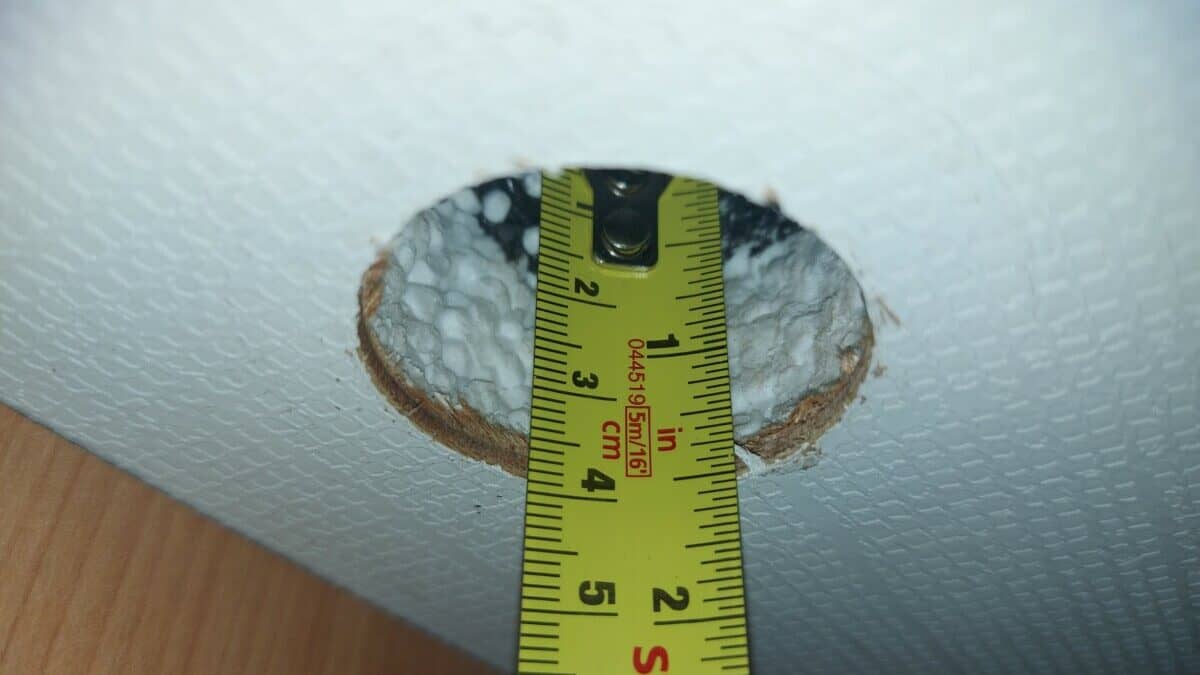
Motorhomes, RVs, and caravans come insulated; my motorhome from 1996 is not made for winter camping and even comes with a 1,5 inch or almost 4 cm insulation in the roof, winter proofed motorhomes come with more insulation, and winterized motorhomes with even more.
This insulation is, in most cases, sufficient, but it is pretty common to add extra insulation to the floor of a motorhome that isn’t winterproofed or winterized by the manufacturer. Suppose you want to become an expert on the insulation in motorhomes and learn the difference between a winterproofed and winterized RV. In that case, I have that covered more in-depth in another article.
But for sure the windshield isn’t insulated right?
That’s correct. Unfortunately, the windshields of motorhomes are usually the weak spot when it comes to insulation since it’s just an average one-glass windshield that is the place where almost all motorhome and RV owners make some adjustments during the winter, no matter how fancy or expensive the vehicle you have.
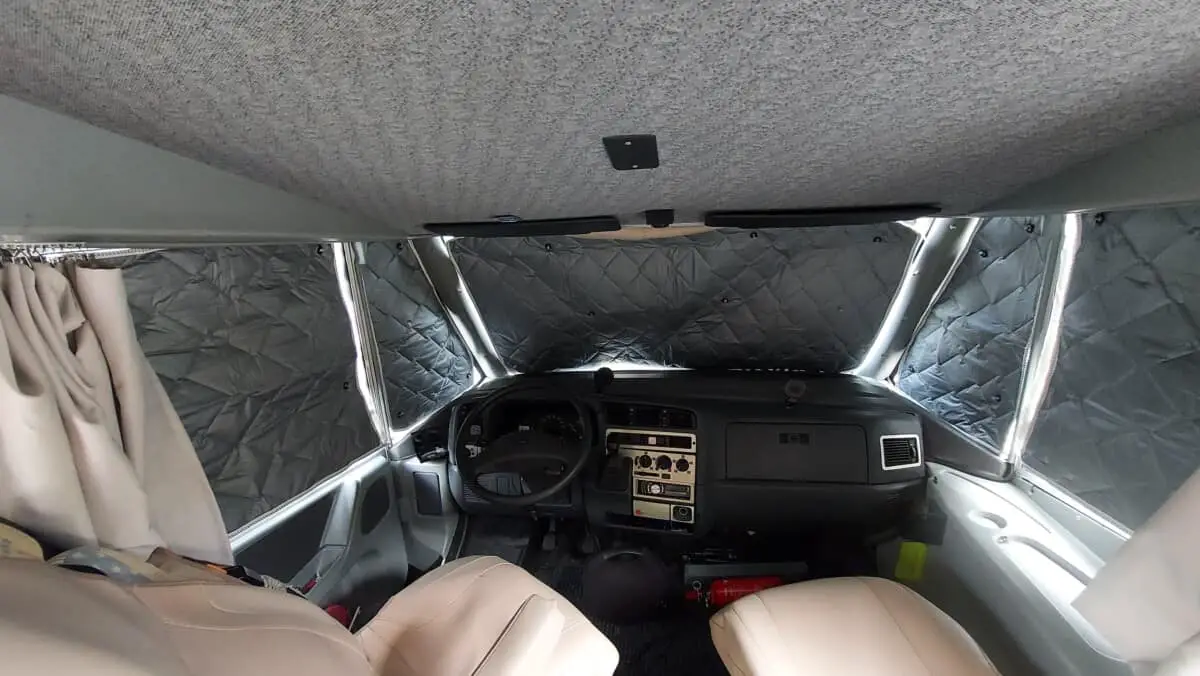
While parked, almost everyone uses an insulation cover on the inside or the outside of the windshield in winter to keep a more even temperature inside. To learn more about this, which option is best to avoid condensation, and how I did it, I have another in-depth article where I go through this and how to insulate RV windows in winter.
Okay, with this information, you already know more than most people about winter camping, and maybe some of the doubts you had before have disappeared, which I hope! So let’s look at the water system and how it works during winter before we go through a bit more pros and cons of simply living in a motorhome during winter.
Does Water System Work In a Motorhome (RV) During Winter?
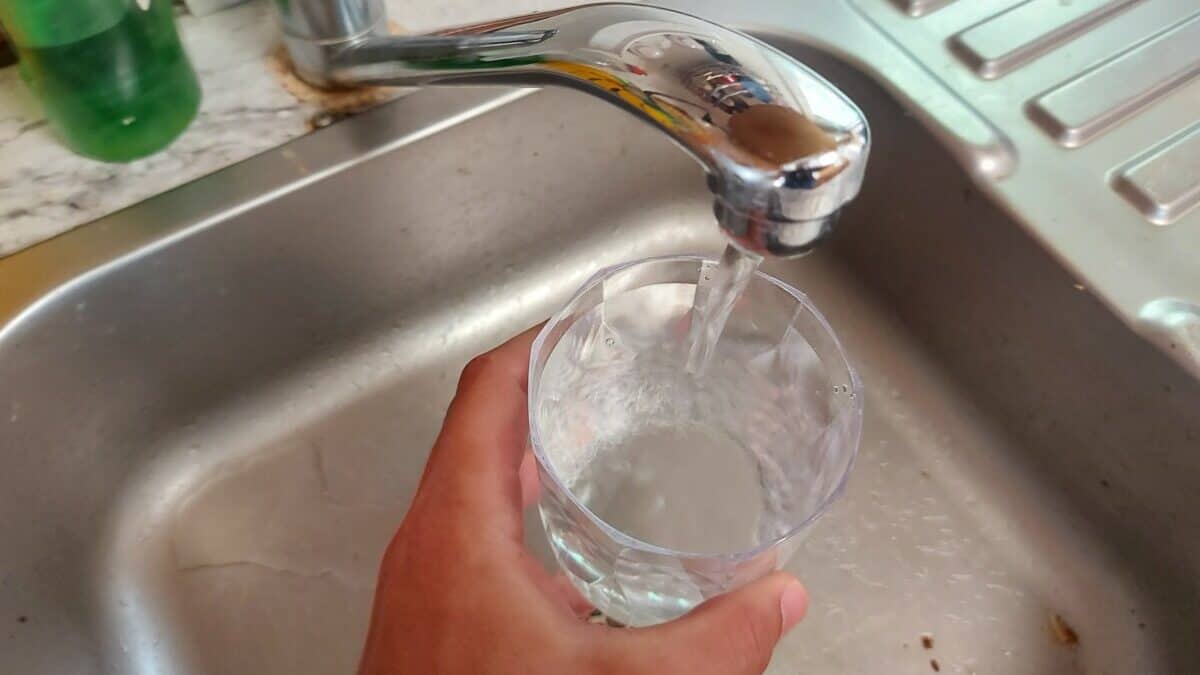
The water system in a motorhome, RV, or caravan works during winter, a poorly insulated summer vehicle can experience some issues at temperatures below -10 C (14 F), and parts of water lines can freeze, but you can make it work down to -25C (-13 F), a vehicle made for winter won’t have issues even at -30 C (-22 F)
So this will depend on your vehicle and what improvements you make on this vehicle according to what temperatures you will be living in. If you have a winterized or grade 3 RV, you will be good even at temperatures around -30 C (-22F) or even colder as long as you run your original heater to keep warm inside. Famous winter brands like KABE usually run winter tests on vehicles at -35C (-31F).
With a winterproofed (grade two) vehicle, you might experience some issues in the same way you would with a seasonal or grade one vehicle; here, it will simply depend on your vehicle and how its water system is placed.
If your grey water tank is exposed underneath your vehicle like mine, this will start freezing as soon as the outside temperature drops below 0 C or 32 F, dont worry. In those cases, you can either disconnect or insulate and heat it yourself.
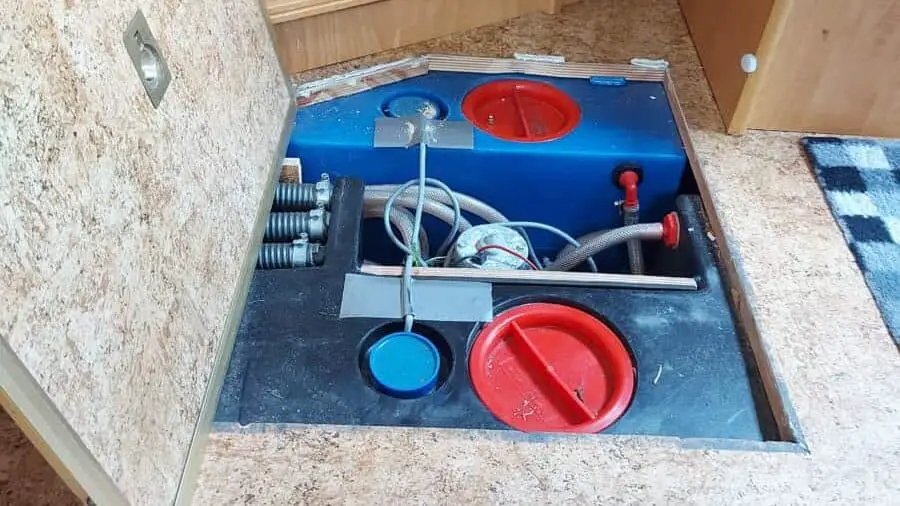
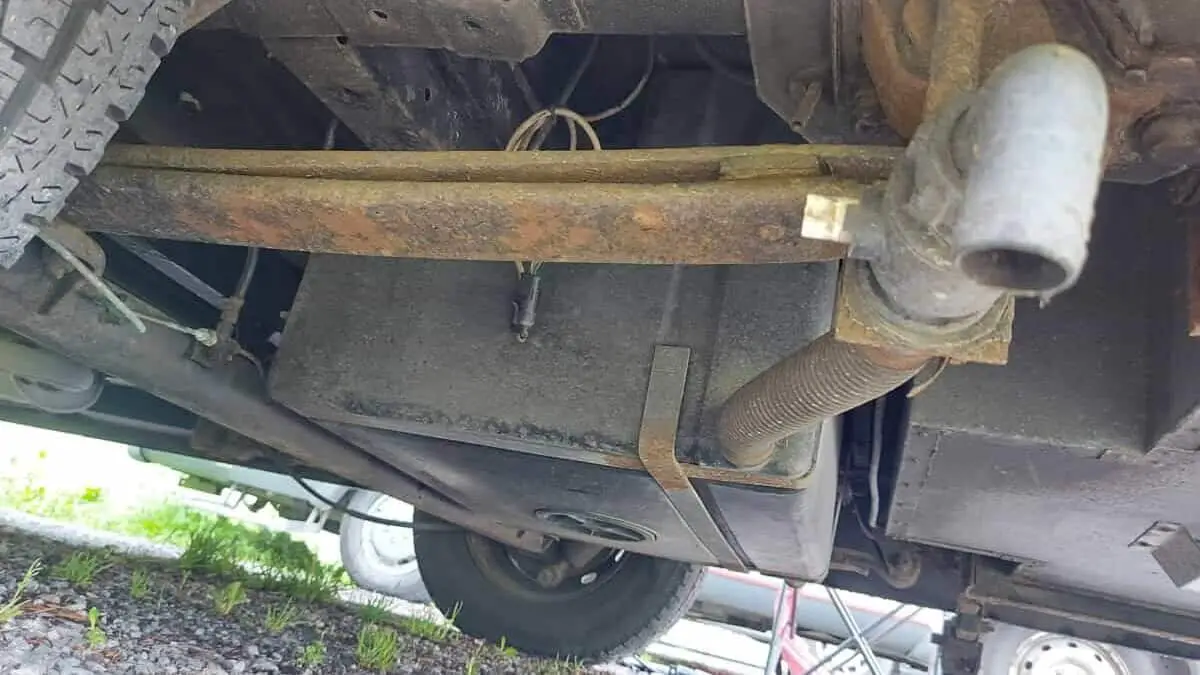
To learn more about keeping a non-insulated grey tank from freezing, I cover what options you have in there and how I disconnected my tank to create free-falling sewage from my sinks to the ground, where you can place a bucket to act as a grey tank.
On the other hand, if you have an insulated grey tank in a heated area, you will be alright since, at that point, your whole vehicle is probably better made for winter usage.
What about the water pipes won’t they freeze?
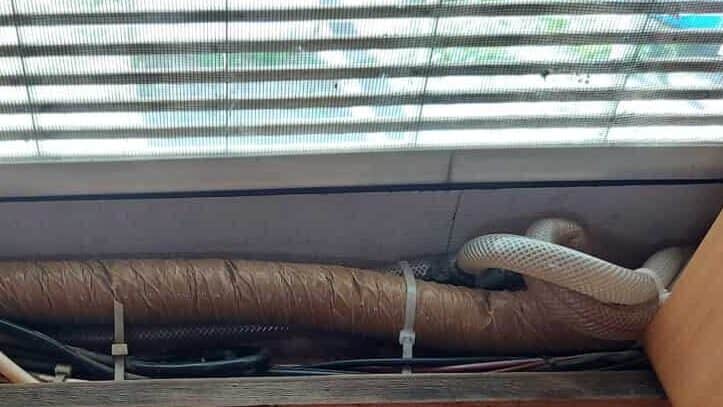
Those can be an issue regarding seasonal or winterproofed vehicles; for example, a part of my water pipe was placed directly under the massive ventilation hole behind the fridge! This part of the water pipe froze during the night when I turned down the heater a little bit, and the outside temperatures were below -10 C or 14F.
After putting some extra insulation around the pipe as a quick fix, they kept unfrozen for a couple more degrees or if I kept running the heater at a higher temperature. Check out my other article to learn if water pipes can freeze in one night.
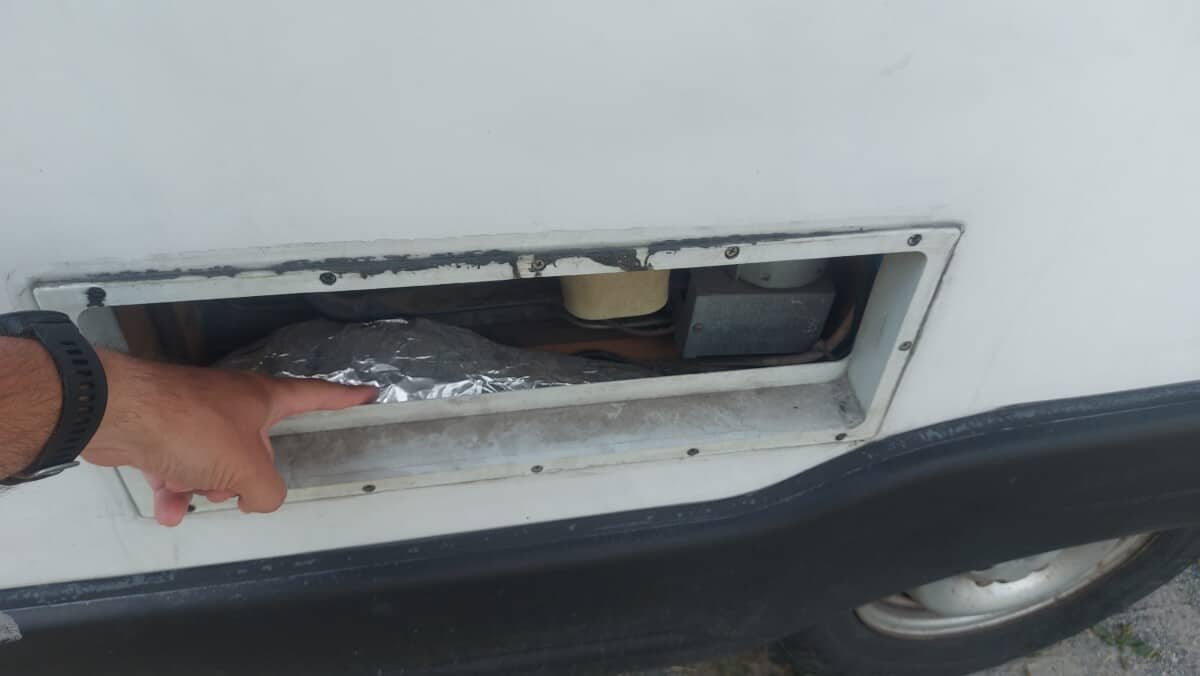
So these parts, especially regarding the water pipes and the grey tank, can be an issue when living full time in winter with a motorhome, RV, or caravan that isn’t made for it. Luckily, we can do some quick fixes ourselves to enjoy winter in all vehicles like
- Use an insulation cover on the windshield to increase the inside temperature.
- Insulate water pipes better.
- Attach extra insulation to the floor.
- Run the original heater
- Run a space heater in addition to the original one
- Insulate or disconnect the grey water tank
Doing this and we will also be able to winter camp in frigid temperatures just like if we had a winterized vehicle!
Winter camping works for all of us! But it has its ups and downs, so let’s look at those when it comes to winter living in a motorhome, RV, or caravan.
PRO’s of Living In a Motorhome (RV) During The Winter
1. Skiing and snowboarding
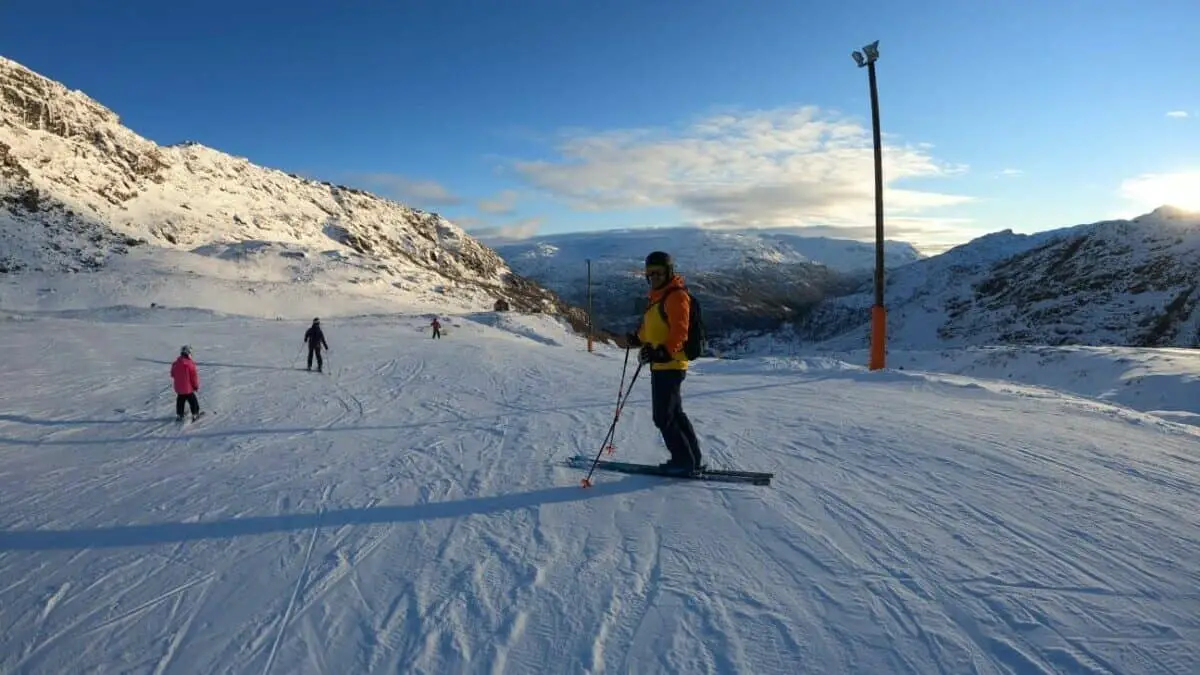
One huge reason that winter camping has grown so drastically and become more and more popular must be due to the accessibility for skiing and snowboarding or at least part of it, nowadays most ski resorts have campsites nearby the slopes, and when living in a winter paradise, you can enjoy the benefit of skiing or snowboarding every day how much you want!
If you are a skiing or snowboarding fan or want to become one, living in a motorhome, RV, or caravan during the winter. Is a massive advantage for you!
Just imagine the sense of freedom and joy you can feel waking up in your cozy RV in winter after a massive snowfall to get over to the ski lift and enjoy the fresh powder each day! Maybe you are working from home, and during your lunch break,k you go skiing for an hour before returning to work.
The best part about living full-time at a place like that is that you will never miss the powder days or manchester mornings when the snow and slopes are just perfect. If the weather is shit, you don’t need to feel forced to get out as you would during a one-week vacation; you can enjoy and choose what days you want to get out on the slopes.
2. Wintersports

Don’t worry. It isn’t only beneficial to skiers and snowboarders to live in a motorhome, RV, or caravan during the winter. If you like any winter sport, you will enjoy the same benefits as a skier or snowboarder.
For those who are into snowmobiles, you could get a trailer and keep your snowmobile with you while winter camping as well!
Maybe you love ice fishing, ice skating, or any other winter sport, and you can enjoy the benefits of temporarily living at the best spot to practice this sport.
3. Cozy

It can be very cozy and lovely living in an RV during the winter, sitting inside with a cup of hot cocoa, coffee, or tea, watching out our huge windshield at the outside snowstorm or the sun shining on the white snow. But, simultaneously, you are warm inside your cozy little “cabin on wheels.”
This part can be charming and undervalued; one of the most incredible parts for me when living in a motorhome during the winter is that I always kind of feel like im outside or doing something even when im not.
Since I have a great view all the time because I choose good spots to park but also because the windows give me such a great view at all times compared to sitting inside an apartment watching a movie or something that feels relatively closed in compared to watching a film in an RV where you also have a fantastic view.
4. Save money on accommodation
This is a huge benefit! You will save a lot of money when it comes to accommodation and living, although the propane costs can run up quite a lot, still nowhere near the rental prices.
For example, when we were living in Norway at a campsite during the winter, we saved around 500 USD/ month in accommodation and heating compared to having a long-term rental apartment; if you compare it to renting an Airbnb room or hotel, well, the price difference will be massive!
Some campsites can be a bit costly, though, and during the winter, I recommend staying at campings so that you won’t have to worry about getting water and where to empty your tanks, get electricity and all of that when it is cold. But it is possible to live without campsites, boondocking or free camping during the winter; this will save you even more money.
You could find a parking lot near a ski resort where you stay most days, but once or twice a week, you pay for the campsite and refill water and empty the tanks or find another way of doing this, and you only need to worry about the propane prices almost.
CONS of Living In a Motorhome During The Winter
1. Shoveling snow
Yes, there are some cons as well; just because you live in a motorhome, RV, or caravan doesnt mean you won’t have to shovel snow during the winter! Not only do you need to shovel the snow around your RV to get around and be able to drive it away, but you will also need to shovel off the snow from the roof after a heavy snowfall.
So when you wake up and notice tons of snow has come and you are super excited about going skiing or snowboarding, you might have to shovel off the roof first.
2. Ice
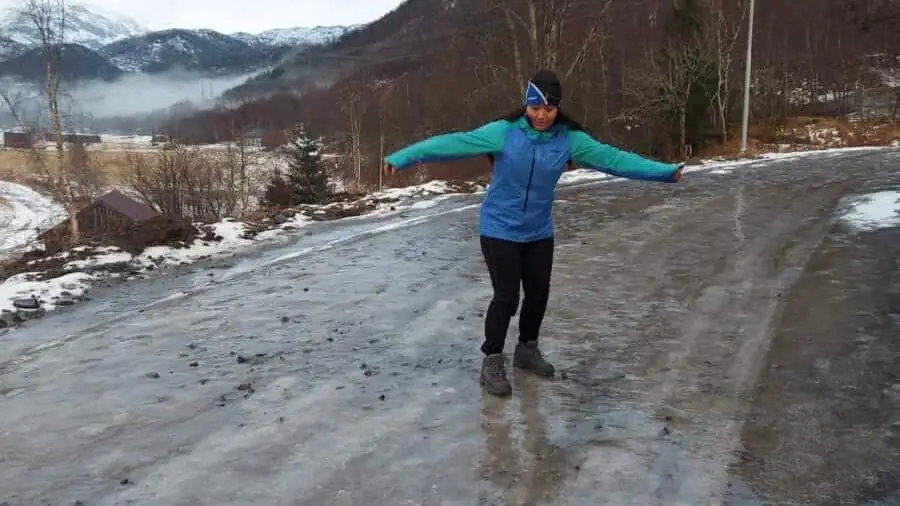
It could get icy, especially at the beginning and end of the winter when the temperatures shift around freezing. It could melt the snow one day and freeze it the next, or maybe it rains one day and freezes the next. So this is another one of those things that if you already don’t like winter, you probably will hate falling like Bambi on the ice every time you go outside!
You probably will hate falling like Bambi on the ice every time you go outside!
On top of this, it won’t only get ice on the ground, but the outside of your vehicle will get icy as well, so you need to go around “deicing” the car once in a while and scrape the ice from your windows.
It can also get tricky to drive unless you have great spike tires or snow chains.
3. snow chains
Suppose you aren’t used to snow chains; practice putting them on and off! Ensure that you have them with you before winter starts!
Snow chains will be a lifesaver in the winter, although they are annoying to put on and take off during a freezing winter; imagine you get out on the road and realize it is icy and slippery on the road and you must get out to put on the snow chains when it is cold, snowing and windy outside, getting wet from standing on your knees while putting them on, frozen fingers because you didn’t put on any gloves.
Well, you get the idea; this could get quite annoying, and again, if you already aren’t a big fan of winter, you will probably hate it after that part, hence why I only recommend winter camping for those who already enjoy winter.
4. Issues with water system at certain temperatures
As I have explained above, some motorhomes, RVs, or caravans aren’t built to withstand winter unless you make some modifications and improvements. Sometimes even then, you could have issues with parts of the water system freezing.
In those cases, some water taps won’t work. It will be annoying to get the frozen parts to thaw, especially if this happens when you rush to do something or if you need to shower before going somewhere. If you notice that the water pipe to your battery is frozen, you might not be laughing for the rest of the day.
Luckily you can improve the insulation to avoid those things happening, but until you figure out precisely what items you need to improve in your vehicle, there will be some swearing and bad mood until all is fixed.
Final Thoughts About Full-Time Winter Living In RV
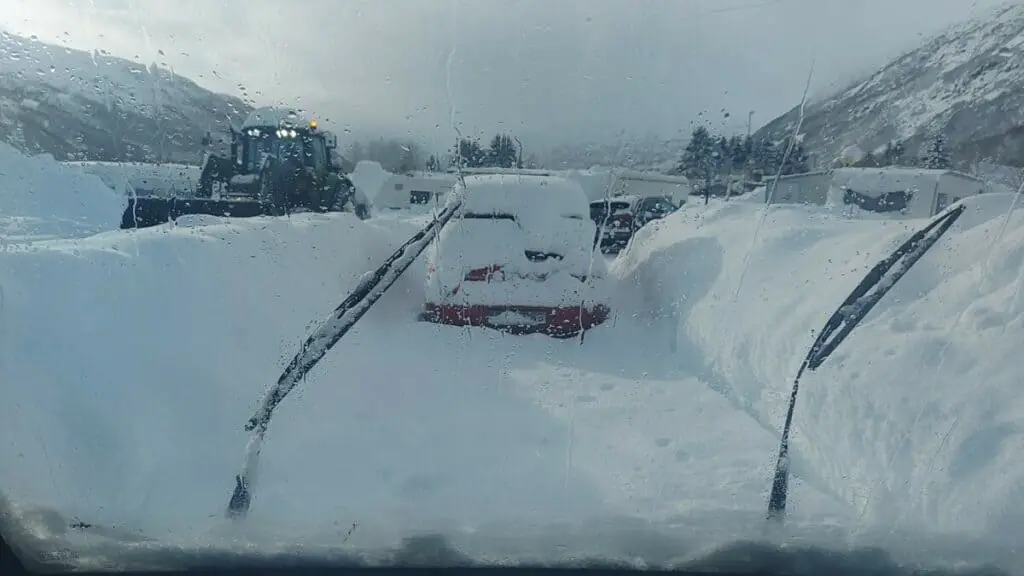
Living full-time or part-time in a motorhome, RV, or caravan during a freezing and snowy winter can be a fantastic experience that makes it possible for you to follow your dreams when it comes to winter sports or just a s way of saving money on rent and also travel during the winter.
It can also be a pain in the ass and annoying, especially if you don’t enjoy all the benefits that winter has to offer, so if you already don’t like winter that much I would seriously consider it and at least try it for a short trip before deciding to live full time in an RV during winter.
There are some things you will need to do differently and things to improve in your vehicle to make it enjoyable during the winter, and depending on your motorhome, you might need to do more or fewer things.
For further information about winter living, I will link to my other articles again here at the bottom so that you can continue reading about essential winter subjects.
- Costs Of Heating a Motorhome (RV) In Winter – My Experience
- How To Insulate Motorhome (RV) Windows In Winter + How I Do
- Are Motorhomes (RV) Insulated? – When & WHAT to Improve
- How I Keep My Motorhome (RV) Warm In Winter! With 9-Tips!
- Learn EXACTLY When RV Water Heater Will Freeze In Winter
- Can Motorhome (RV) Pipes Freeze In One Night While Camping?
- How To Keep NON-Insulated Grey Tank From Freezing In Winter
